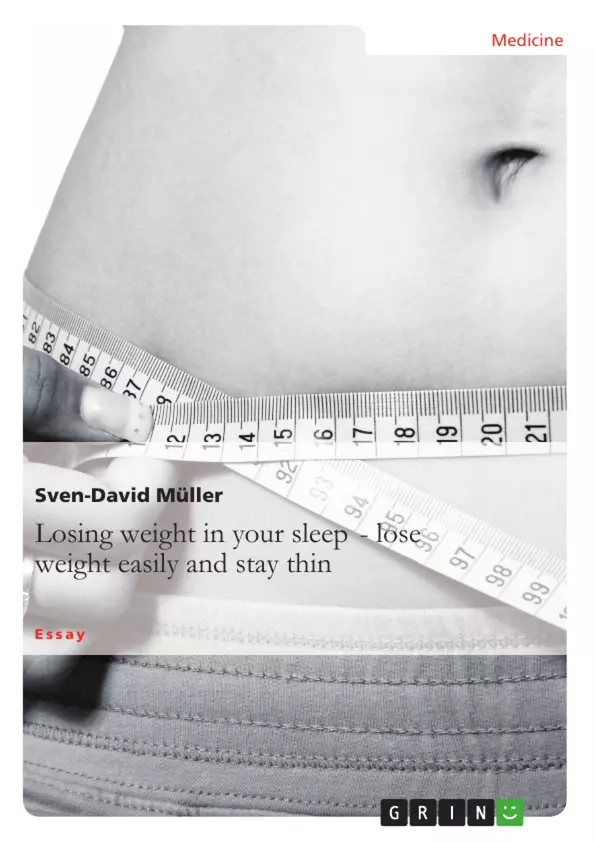We live in a land of virtually unlimited food supply and we like to make substantial use of this. Industrialised farming, fast means of transport and improved ways of cooling and preserving food, ensure that the food availability is enormous and independent of the seasons. While man once required excess body fat as a reserve for lean times, today refrigerators and preservation methods mean that we rarely encounter supply shortages. However, our metabolism is still set on efficient energy intake from food and on the storage of body fat. The per capita consumption of fat and products based on white flour has grown rapidly in the last 50 years, whereas that of high-fibre wholemeal products has declined sharply. Professor Dr. Walter Feldheim, University of Kiel, described obesity as a dietary fibre deficiency disorder - because fibres saturate and, thus prevent overeating.
A lack of exercise in everyday life as well as perceived stress during leisure time, lead to us eating more and more fast food, processed as well as part-processed products. These products burden the physique with plenty of fat. What’s more, eating is a process driven by emotion. In fact, by eating many people try to satisfy needs other than hunger and use it as an outlet in emotionally stressful situations such as anger, sadness, loneliness or insecurity. This type of eating has nothing to do with satisfying one’s hunger or indeed with the necessity to supply the organism with energy, nutrients and health-preserving vitamins and minerals. [...]
Inhaltsverzeichnis (Table of Contents)
- Being overweight and its numerous causes
- What are the consequences if overweight individuals remain overweight?
- Weight loss, hunger and satiety
- Losing weight with the innovative Nutrition program offered by the Society for Nutritional Medicine and Dietetic!
- How to be (eat) successful (ly) long-term?
Zielsetzung und Themenschwerpunkte (Objectives and Key Themes)
This text aims to provide a comprehensive overview of being overweight, its causes, consequences, and potential solutions. It explores the complexities of weight management, highlighting the role of nutrition, exercise, and lifestyle choices.
- The impact of dietary habits on weight gain, including the consumption of processed foods, dietary fiber deficiency, and excessive calorie intake.
- The consequences of being overweight, ranging from physical health risks like high blood pressure and diabetes to psychological and social implications.
- The importance of a balanced and healthy diet in preventing and managing weight, emphasizing the role of whole foods, fiber, and portion control.
- The dangers of crash diets and the significance of long-term lifestyle changes for sustainable weight management.
- The role of exercise as an essential component of a healthy lifestyle and its contribution to weight loss and overall well-being.
Zusammenfassung der Kapitel (Chapter Summaries)
The first chapter discusses the numerous causes of being overweight, focusing on dietary factors such as excessive calorie intake, processed food consumption, and lack of fiber. The chapter also emphasizes the role of genetics and lifestyle factors like lack of exercise and emotional eating.
The second chapter explores the potential health consequences of being overweight, including increased risk of cardiovascular diseases, diabetes, and musculoskeletal problems. It emphasizes the importance of addressing overweight issues early on to prevent long-term health complications.
The third chapter focuses on weight loss, hunger, and satiety. It discusses the role of gastric expansion, mindful eating, and the importance of distinguishing between hunger and appetite. The chapter also explores the role of insulin and its impact on fat loss.
The fourth chapter introduces the innovative Nutrition program offered by the Society for Nutritional Medicine and Dietetic! The chapter outlines key principles of healthy eating, emphasizing the importance of a balanced diet, portion control, and increased fiber intake.
The fifth chapter provides practical advice for achieving and maintaining a healthy weight. It stresses the importance of long-term lifestyle changes, including healthy eating habits and regular exercise. The chapter also addresses the potential pitfalls of crash diets and emphasizes the importance of a balanced approach to weight management.
Schlüsselwörter (Keywords)
This text focuses on the following key themes and concepts: obesity, overweight, weight management, nutrition, dietary habits, processed food, fiber, exercise, lifestyle changes, health consequences, cardiovascular disease, diabetes, mindful eating, crash diets, and long-term weight loss.
Frequently Asked Questions
Why is obesity described as a dietary fiber deficiency disorder?
Professor Dr. Walter Feldheim noted that dietary fibers provide satiety, which prevents overeating, a major cause of obesity in modern diets.
What role does emotional eating play in weight gain?
Many people use food as an outlet for emotions like anger, sadness, or insecurity, rather than satisfying physical hunger.
How does insulin affect fat loss?
High insulin levels, often caused by refined flour and sugar, can inhibit fat burning, especially during sleep.
What are the dangers of crash diets?
Crash diets often lead to a "yo-yo effect" because they are not sustainable and don't address long-term lifestyle changes.
How can one successfully lose weight long-term?
Success requires a balanced diet rich in whole foods and fiber, combined with regular exercise and mindful eating habits.
- Quote paper
- Sven-David Müller (Author), 2012, Losing weight in your sleep – lose weight easily and stay thin, Munich, GRIN Verlag, https://www.grin.com/document/283882



